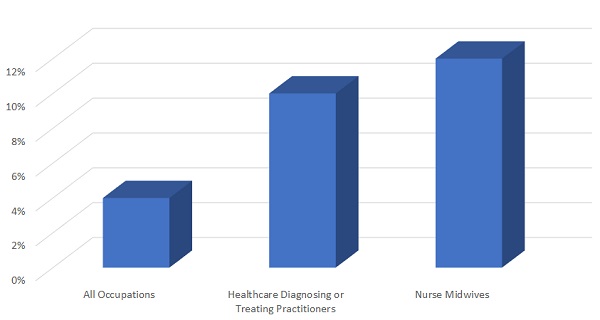With a master’s degree in nurse-midwifery, one of the highest-paying master’s degrees, you can become qualified to provide a range of healthcare services – not only maternity care and childbirth services – to women. However, patients’ ability to choose you as their provider depends largely on their health insurance coverage. If you’re considering a career as a Certified Nurse-Midwife (CNM), you might wonder how health insurance works for midwife care and how that element will affect your career prospects and earning potential.
IMAGE SOURCE: Pixabay, public domain
Insurance Coverage of Certified Nurse-Midwives
Are healthcare services provided by midwives covered by insurance? For midwives who attain the Certified Nurse-Midwife credential, the answer is usually “yes.” As of 2017, both federal Medicare insurance and Medicaid insurance provided through all states were required to cover health care services provided by a CNM, according to the American College of Nurse-Midwives. The same report noted that private health insurance plans, such as those provided through an employer, are required to cover care provided by Certified Nurse Midwives in most states.
This hasn’t always been the case. In August 2010, the Centers for Medicare & Medicaid Services announced that, beginning in January 2011, Medicare would reimburse services provided by Certified Nurse-Midwives at 100 percent of the Medicare Physician Fee Schedule. In other words, midwife services would be covered and reimbursed by Medicare at the same amount as the same services would be covered if provided by a physician. Before that, Medicare only paid Certified Nurse-Midwives 65 percent of the physician fee schedule amount for doing the same work.
In some states, such as New Jersey, Certified Nurse Midwives must first be approved as a provider by the state Medicaid program or by other state insurance programs before they can be eligible for reimbursement under that program.
Getting Into Insurance Networks as a CNM
Of course, not all CNMs are covered by all insurance carriers and policies, just as not all doctors are covered by all policies. If you want to make sure your services are accessible to patients, you need to go through the processes to be registered with government insurance programs or become part of private health insurers’ networks. For Medicare and Medicaid payments, this process may include acquiring a National Provider Identifier and securing a Medicare Provider Transactions Access Number, according to the American College of Nurse-Midwives. Getting into private insurance networks requires the provider to contract with those insurance carriers.
In large part because the program is required to cover health care services provided by a CNM, Medicaid is generally considered the largest single payer for Certified Nurse-Midwives, according to the American College of Nurse-Midwives.
Insurance Coverage, Job Outlook and Salary Potential for Nurse Midwives
For patients, insurance coverage affects access to care. For providers like Certified Nurse-Midwives, it affects your career opportunities and your earning potential. For nurse midwives, the job outlook is favorable. The United States Bureau of Labor Statistics (BLS) expects jobs for nurse midwives to grow at a rate of 12 percent between 2019 and 2029. That’s much faster than the average job growth rate expected across all occupations and even faster than the 10 percent rate of growth expected among all healthcare diagnosing or treating practitioners. However, since the nurse midwife occupation is relatively small, consisting of only 7,200 providers in 2019, this above-average increase in job opportunities will like result in just 800 new positions.
Salary is another area of concern that goes along with insurance coverage and network participation. The median salary for nurse midwives in 2019 was $105,030, according to the BLS. Naturally, whether you are part of insurance networks and how much insurers reimburse you for your services as a provider affect your earnings.
Nurse midwives can’t realistically expect to earn as much as obstetricians, who, the BLS reported, make a median salary of $233,610. Nurse midwives earn as much as 60 percent of an obstetrician’s salary in some states, like Wisconsin, where the average CNM salary is $111,480, according to the American College of Nurse-Midwives. In other states, like Oklahoma, CNMs earn just 25 percent of what obstetricians do, or an average salary of just $61,960. Contracting with private insurance carriers at higher rates of reimbursement can help you earn more money for the work you do.
Correctly documenting and coding the services you provide as a CNM is crucial for increasing your salary to your full earning potential, the American College of Nurse-Midwives reported.
Additional Resources
Can Midwives Order the Same Tests as Doctors?


